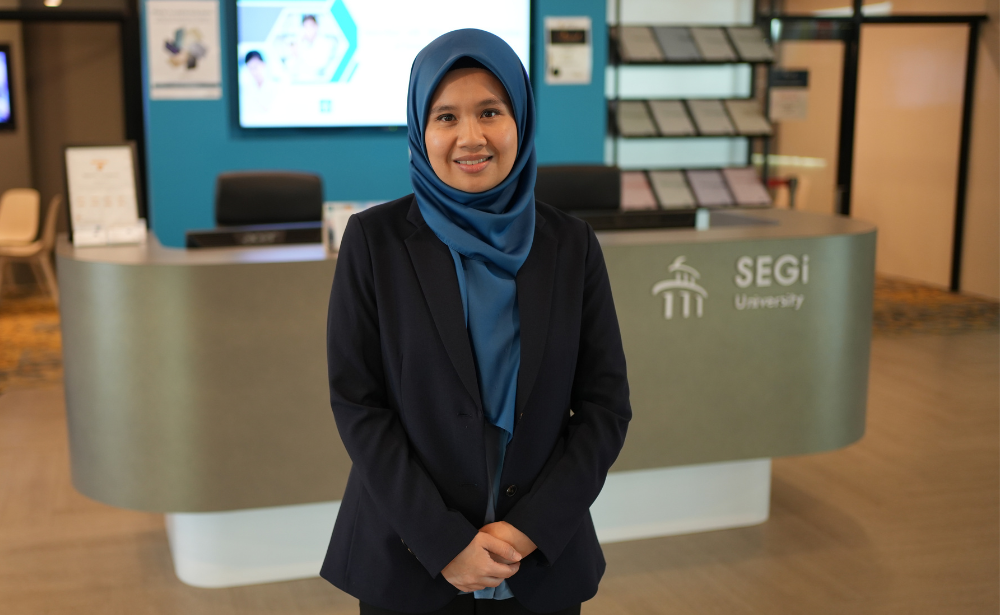In the vast landscape of human knowledge, research plays a pivotal role in charting unexplored territories and dispelling ambiguity. It embodies a systematic and scientific quest for fresh insights, transcending the boundaries of specific fields. Within the realm of education, research is not merely an academic exercise; it is a transformative force that shapes the core of learning.
Dr Fazliny Abd Rahman, a distinguished biochemistry lecturer in the Faculty of Dentistry, has achieved a significant milestone by securing a fundamental research grant scheme (FRGS) for Phase 1 in 2023, courtesy of the Ministry of Higher Education (MOHE). This esteemed grant, amounting to RM138,940, serves as a testament to her unwavering dedication and expertise in the field.
The project, titled ‘Gene Expression Profiling Reveals Markers Promoting Osteoblast Potential in Dental Pulp Stem Cells Treated with Aspirin,’ is poised to embark on a transformative journey commencing on 1 October 2023 and extending until September 2026.
The three-year project involves collaboration with the Faculty of Dentistry at SEGi University, the Faculty of Dentistry and the Faculty of Science at Universiti Malaya, with Dr Fazliny serving as the principal investigator (PI). She is joined by a team of esteemed co-researchers: Dato’ Prof Dr Ahmad Termizi Zamzuri, Dean of the Faculty of Dentistry at SEGi University; Mdm Sulinda Daud from SEGi University; and Dr Karen Ng Lee Peng and Dr Chang Siow Wee from Universiti Malaya. This interdisciplinary collaboration holds the promise of ushering in fresh insights and pioneering discoveries in the realm of dental research.
The project’s focus is nothing short of revolutionary: it aims to uncover the impact of aspirin on dental pulp stem cells (DPSCs) during osteogenic differentiation. DPSCs, renowned for their self-renewal and osteogenic differentiation properties, offer a promising avenue for orofacial bone regeneration and periodontal treatment.
Aspirin (ASA), a well-established non-steroidal inflammatory drug (NSAID), has traditionally served as an anti-inflammatory and analgesic medication for orthopaedic patients. However, recent studies have shed light on ASA’s potential to enhance bone marrow mesenchymal stem cell (BMMSC) regeneration, opening doors for regenerative therapies in bone fractures, non-union cases, articular cartilage regeneration in arthritic joints, and the healing of ligaments and tendons.
Nonetheless, the impact of aspirin on the osteogenic differentiation of DPSCs remains largely uncharted territory in dental research. This study aims to bridge that knowledge gap by uncovering the markers involved in aspirin-treated DPSCs during osteogenic differentiation.
The research journey commences with the isolation and characterization of mesenchymal stem cells (MSCs) derived from dental pulp. These MSCs will then undergo aspirin treatment, with meticulous evaluations of cytotoxicity and osteogenic potential.
The investigation into ASA’s influence on MSCs’ osteogenic potential will employ a combination of tissue culture-based assays and cutting-edge next-generation sequencing technology (RNA-seq) analysis. Subsequent bioinformatics analysis will unearth potential markers central to osteoblast formation.
The findings from this groundbreaking study promise to shed light on the global gene expression profiles influenced by ASA, offering fresh insights into the osteogenic potential of stem cell-derived dental pulp. These identified markers hold the key to innovative therapeutic targets for orofacial bone regeneration and various periodontal conditions.
Dr Fazliny’s success in obtaining this grant underscores her steadfast commitment to advancing dental research and expanding the frontiers of scientific understanding. Her research holds the potential to make substantial contributions to the field, ultimately enhancing treatments for patients grappling with orofacial and periodontal issues. We commend her dedication and eagerly anticipate the transformative insights that will emerge from this pioneering research initiative.
Heartiest congratulations once again, Dr Fazliny, on your remarkable achievement. We extend our best wishes for your continued success in completing your research project.


